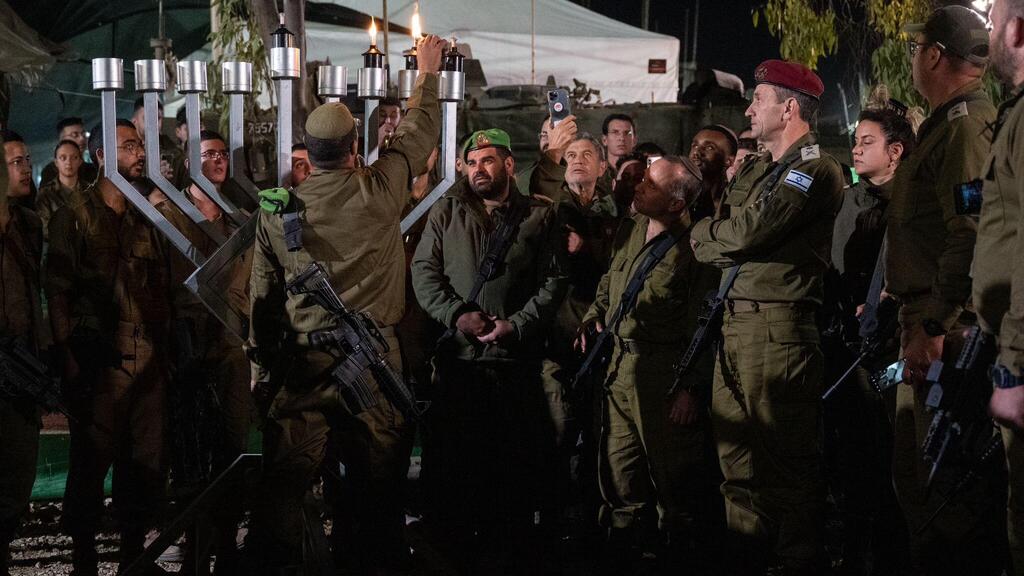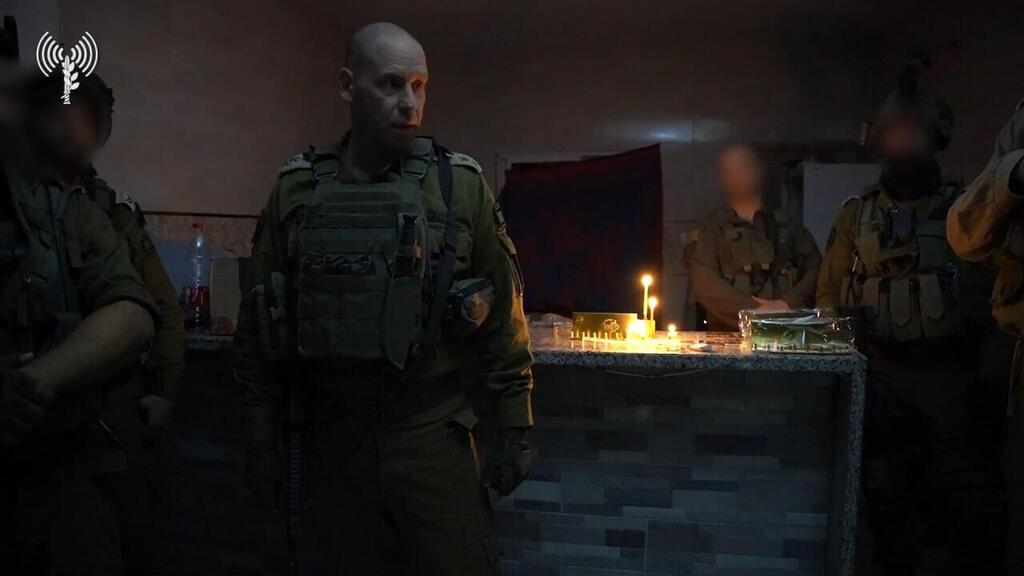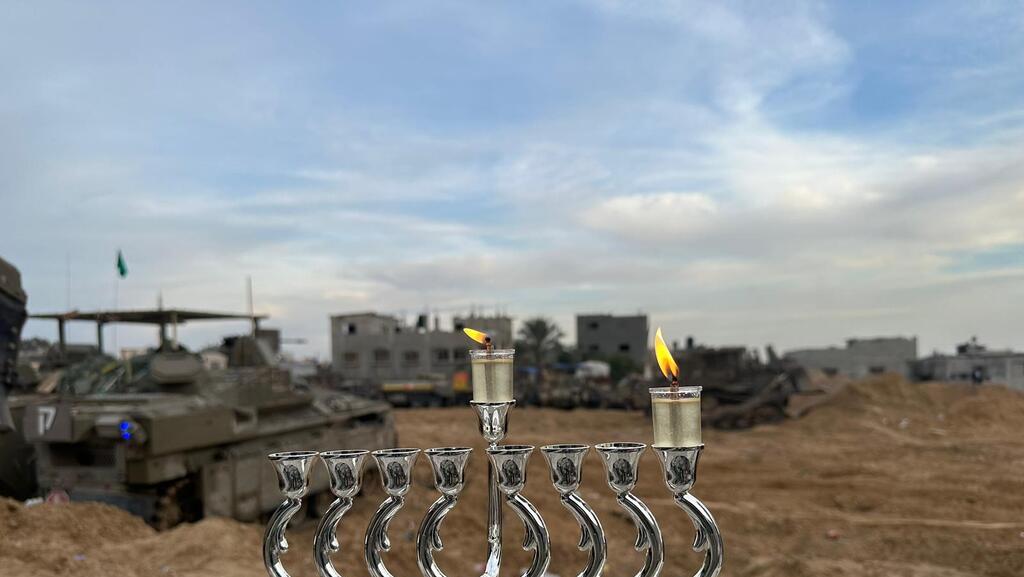In Jewish households, it is customary to sing the liturgical poem "Maoz Tzur" following the lighting of the Menorah. The hymn, translated as "Strong Rock (of my Salvation)," depicts the enduring struggles and hardships faced by the people of Israel throughout history, alongside their eventual deliverance and redemption. It culminates with a plea for God to redeem us from our present exile.
More stories:
Each stanza of the song symbolizes a distinct exile: “Raot sav’ah nafshee” (My soul had been sated with troubles), representing the Egyptian exile; “Dveer kodsho” (to the holy abode), signifying the Babylonian exile; “Kerot komat” (to sever the towering cypress), alluding to the Persian kingdom; “Yevanim nikbetzoo alai” (Greeks gathered against me), representing the kingdom of Greece; and “Chasof zeroah kodshekha” (bare your holy arm), signifying the kingdom of Edom.
3 View gallery


IDF Chief of Staff Herzi Halevi lights a Hanukkah menorah with soldiers and commanders of the Nahal Brigade
(Photo: IDF Spokesperson's Unit)
Was the song written for Hanukkah?
“Maoz Tzur” doesn’t seem specifically dedicated to Hanukkah, as it mentions all the exiles, from Egypt to Edom. However, it has become customary among Jews to associate this song with Hanukkah. This connection might stem from the hymn’s opening reference to the dedication of the altar, which is directly related to the holiday. Yet, this reference remains ambiguous as the song’s peak aspiration toward a complete redemption and “dedication of the altar” might focus on the construction of the Temple, rather than Hanukkah itself.
The prevalent custom of singing “Maoz Tzur” during Hanukkah might be due to the notion that Hanukkah represents a concealed redemption. Previous redemptions were either openly miraculous or occurred during prophetic periods (Haggai, Zechariah and Malachi), making their divine origins apparent. However, during Hanukkah there was no explicit communication from God. It took the discernment of the sages, the "Bnei Bina," to recognize the hidden miracle of war as the handiwork of God, making these days a time for moments of praise and gratitude.
As the first post-prophetic-era miracle, Hanukkah serves as a symbol for the subsequent period of exile, urging us to diligently seek God’s presence, much like finding the pure cruse of oil within the dark realities in which we sometimes find ourselves.
In the millennia since the miracle of Hanukkah, the hand of God has remained veiled in concealment. Sometimes in observing a single event, perceiving divine providence (“hashgacha”) might prove challenging. Yet, from a historical perspective encompassing events like Passover and the entrance to the land of Israel, the return to Zion, and the miracle of Purim, the pattern emerges. Collectively, these occurrences reveal the hand of God, prompting an understanding that, even in the quieter miracle of Hanukkah, God’s influence is present. This perspective ought to guide future generations, urging them to seek God’s presence in both obscured and illuminated facets of life.
Furthermore, when we examine each individual miracle or rescue experienced by the people of Israel, isolating them might suggest happenstance, save for the unequivocal miracles like the Exodus in Egypt. However, when viewed as a sequence of events, a grander design emerges, revealing G-d’s protective presence throughout. If we were to expand the stanzas of “Maoz Tzur” to encompass the salvations from all the wars of Israel – the War of Independence, the Six-Day War, the Yom Kippur War, the Swords of Iron War – we’d witness how G-d continues to shield and safeguard us. Therefore, “Maoz Tzur” serves as a source of strength, reinforcing the understanding that G-d “moves about in your camp to protect you and to deliver your enemies to you."
The seven shepherds and our unity
The hymn’s final stanza, invoking the plea to “establish for us the seven shepherds,” presents an intriguing parallel to our contemporary context. According to the Talmud (Sukkah 52), these shepherds are Adam, Seth, and Methuselah, Abraham, Jacob, Moses and David. In Kabbalistic teachings, they are linked to the seven Ushpizin, or the seven shepherds of the nation: Abraham, Issac, Jacob, Moses, Aaron, Joseph and David.
What is the role of the shepherds? Primarily, the shepherd embodies leadership – a guide for the flock. When Moses asks G-d to choose a leader for the people of Israel, he adds: “so that G-d’s community may not be like sheep that have no shepherd” (Numbers 27: 17).” In our prayer for shepherds, we are actually begging for leaders who will steer us toward a righteous path, fostering closeness to G-d, and thereby hastening redemption.
However, there’s an alternate interpretation of ‘shepherd’ tied to some of these figures who were actual shepherds, such as Jacob, Moses and David. According to Jewish sages in Midrash Shemot Rabbah (2:2), “one who knows how to shepherd the flock, each according to their strength, should come and shepherd My people," meaning that a shepherd should understand and cater to the needs of each within the flock, unifying them and promoting companionship among them. The Baal Shem Tov reinforces this, stating that (Torah Studies, Vayeshev, 1) a shepherd’s essence lies in uniting and connecting the flock to one place in order to cultivate camaraderie and solidarity – "so that they will not disperse here and there.”
3 View gallery


Southern Command chief Brig. Gen. Yaron Finkelman lights Hanukkah candles with troops in Jabaliya, Gaza
(Photo: IDF Spokesperson's Unit)
In the context of redemption, too, a leader must unify the people of Israel, fostering harmony pivotal for the “redemption.” A notable distinction arises in the hymn’s grammar: The initial stanzas employ singular phrasing ("my salvation", "my house of prayer", "My soul had been sated with troubles", "brought me", "gathered on me", etc.) despite referring to collective troubles; the final stanza shifts to the plural (“avenge the blood of your servants,” “establish for us the seven shepherds”). This alteration might hint at the necessity of unity to attain redemption. This aligns with the need for a shepherd who bridges divides – leading toward a state of unity, echoing the sentiment, “and one shepherd will be for all.
Since the outbreak of the Gaza war, I have visited our soldiers numerous times. Witnessing the love and unity among them has been immensely uplifting. I’m grateful that this unity isn’t confined to the soldiers alone; it permeates all levels of our society, bridging the gap between religious and secular, reform supporters and opponents – everyone coming together to aid in this time of need. The landscape transformed, billboards replaced by the flags of our State of Israel. The global Jewish community uniting to support our soldiers.
I firmly believe that the people of Israel are inherently united. Some might argue that the unity now is a product of war, but I’d counter that it’s been ingrained in us for thousands of years. Our history is unlike any other, and those who attempted to break away from this unity eventually realized that it is inescapable. They came to acknowledge that we are one in essence, one people, one family, bound by a historic destiny that spans millennia – the people of God.
Our significant task lies in sustaining this unity beyond the current crisis. It involves seeking our commonalities, nurturing love and appreciation, and skillfully containing the diverse viewpoints that set us apart.
Thank G-d, we have a resilient nation and a strong army. With G-d's help and with our unwavering belief in our path and our faith in God who walks among us and helps us, we will be victorious. With G-d's help may all the wounded recover fully, the abducted return home swiftly, and may soldiers and civilians alike be shielded from harm. I pray that we may dwell in tranquility, peace, contentment and unity in our sacred land.
- Rabbi Yosef Tzvi Rimon is the rabbinic head of JCT - Lev Academic Center, the chairman of the educational organization Sulamot and the chief rabbi of Gush Etzion



